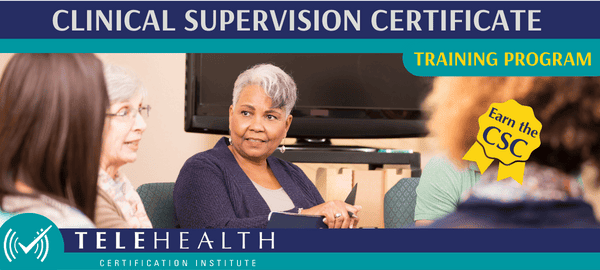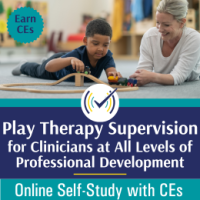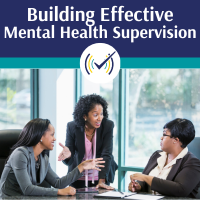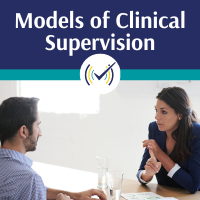This course bundle includes enrollment in 15 online self-study courses.

The Clinical Supervision Certificate Program is a comprehensive training program for active clinical supervisors or for those just beginning their supervision practice. This customized selection of expert-led courses offers up to 49 CEs (10.5 of which are Ethics).
This program is for behavioral health professionals wanting to provide clinical supervision to graduate students, interns, residents, those seeking licensure, and licensed clinicians. Credential holders include: counselors, social workers, MFTs, psychologists, addiction counselors, and other behavioral health professionals.
Enrollment in the Clinical Supervision Certificate Training Program offers:
- Fifteen individual courses that offer a total of 49 CEs
- Instruction provided by seasoned Clinical Supervisors on a variety of topics
- The Clinical Supervision Certificate (CSC)
- Instruction material that addresses each of the ten topics required for those seeking the Approved Clinical Supervisor (ACS) credential. Telehealth Certification Institute LLC is a Center for Credentialing & Education (CCE) Registered 1005-ACS training provider. This program is approved as an ACS training course.
Enrollment in the full program is offered at a discount of more than 60% off the full price for each course.
The CSC can only be earned by those enrolled in the Clinical Supervision Certificate Training Program
Instruction consists of 49 hours of video instruction and a post-test.
Upon registration, the following 15 courses will be added to your account, along with access to the Clinical Supervision Certificate:
- Foundations of Supervision: Preparing for Effective Supervision, Online Self-Study
- Theoretical Frameworks and Models of Clinical Supervision, Online Self-Study
- Understanding and Developing an Effective Clinical Supervision Relationship, Online Self-Study
- Methods of Supervision, Online Self-Study
- The Nuts and Bolts of Clinical Supervision in Groups, Online Self-Study
- How Clinical Supervisors Can Adjust Their Evaluative Lens by Understanding the “Zone of Proximal Development”, Online Self-Study
- The Ethical Dance with Gatekeeping: The Common Complaints Against Therapists That Supervisors Need to Know, Online Self-Study
- Preparing Supervisees for TeleMental Health, Online Self-Study
- TeleSupervision and TeleConsultation, Online Self-Study
- Documentation for Supervisors, Online Self-Study
- Navigating Licensure Supervision Within an Organization, Online Self-Study
- It’s Not Just Your Name on the Line: How Your Contract Supports Compliance and Standards in Clinical Supervision, Online Self-Study
- Ethics for Supervisors, Online Self-Study
- Fostering Counselor Development Utilizing a Social Justice Lens in Supervision, Online Self-Study
- Race, Power, and Privilege: Addressing Cross Cultural Dynamics in Supervision, Online Self-Study
Once each course has been completed and the Certificate of Completion indicating CEs has been issued, participants can then claim the Clinical Supervision Certificate (CSC)
Upon completion of "Foundations of Supervision: Preparing for Effective Supervision", participants will be able to:
- List three possible benefits and drawbacks of telemental health.
- Explain how licensure law in the United States impacts telemental health services.
- List three ethical standards that are specifically related to telemental health.
- Describe the process of conducting video and phone therapy sessions from start to finish.
Upon completion of "Theoretical Frameworks and Models of Clinical Supervision", participants will be able to:
- Name 5 categories of supervision models.
- List and describe a minimum of 5 supervision models.
- Differentiate and define first wave supervision models and second wave supervision models.
- Describe the benefits of combining more than one supervision model.
- Select and apply supervision models to match case scenarios about fictional supervisees.
- Describe why it is important for supervisors to be well versed and discerning as to what supervision models they use.
Upon completion of "Understanding and Developing an Effective Clinical Supervision Relationship", participants will be able to:
- Discuss the importance of a supervisory relationship and measuring its effectiveness.
- Share key aspects/traits for building a collaborative relationship.
- Explain the importance of power in the relationship and how to use it appropriately and effectively.
- Describe ways to prevent or resolve conflict and resistance.
Upon completion of "Methods of Supervision", participants will be able to:
- Explain the importance of having a model of supervision.
- List several methods of supervision.
- List two ways for building supervisee cultural competence.
- Illustrate methods of monitoring, providing feedback, and evaluations.
- Discuss suggestions for managing supervisee concerns, deficiencies and anxiety.
Upon completion of "The Nuts and Bolts of Clinical Supervision in Groups", participants will be able to:
- Discuss the stages of group and core group processes and how these apply to clinical supervision in groups.
- Analyze the power dynamics and cultural considerations that are present in clinical supervision in groups.
- Identify specific models and techniques that can be used in clinical supervision in groups.
- Develop skills to balance the needs of individual supervisees with the needs of the supervision group.
Upon completion of "How Clinical Supervisors Can Adjust Their Evaluative Lens by Understanding the 'Zone of Proximal Development'”, participants will be able to:
- Explain the impact that the zone of proximal development has on the skill set of clinical supervisors and counselors.
- Describe how the zone of proximal development can be utilized to better understand the relationships between the supervisor and supervisee.
Upon completion of "The Ethical Dance with Gatekeeping: The Common Complaints Against Therapists That Supervisors Need to Know", participants will be able to:
- Explore and examine the common ethical complaints therapists face in clinical practice.
- Examine the supervisor's role as a gatekeeper.
- Demonstrate how to use the ethical decision making in clinical supervision.
Upon completion of "Preparing Supervisees for TeleMental Health", participants will be able to:
- Explain the Supervisor’s ethical and legal responsibility to evaluate a supervisee's readiness to provide telemental health service.
- Describe the process of evaluating a supervisee's readiness to provide telemental health service.
- Apply a supervisee telemental health preparedness checklist when evaluating a supervisee’s readiness.
Upon completion of "TeleSupervision and TeleConsultation", participants will be able to:
- Address, enhance, and identify beginning supervisors and advanced supervisors concerns about telesupervision.
- Address special considerations for the individual needs of supervisees in group supervision, assess how group telesupervision can accelerate supervisees’ learning and ways to decrease barriers to telesupervision.
- Explore the developmental needs of supervisees and increase the supervisee’s commitment to the working alliance within the structured environment needed in telesupervision.
Upon completion of "Documentation for Supervisors", participants will be able to:
- Describe the value of documentation in supporting our professional work.
- Participants will define key components of supervision documentation including maintaining a supervisee file.
- Participants will identify several tips for enhanced, best practice note content.
Upon completion of "Navigating Licensure Supervision Within an Organization", participants will be able to:
- Describe the difference between administrative versus clinical supervision.
- Conduct effective supervision via teleservices.
- Document processes for supervision.
Upon completion of "It’s Not Just Your Name on the Line: How Your Contract Supports Compliance and Standards in Clinical Supervision", participants will be able to:
- Explain the obligations & functions of a clinical supervisor.
- Explain the purpose of contracts in our profession.
- Describe disclosure statement and contract elements.
- Upon completion of "Ethics for Supervisors", participants will be able to:
- Name ethical areas of supervisor competence, knowledge, and practice.
- Identify key ethics of the supervisory relationship.
- Discuss the ethical aspects of gatekeeping and monitoring supervisee development and competence.
- Describe common examples of liability concerns and a suggestion for managing.
Upon completion of "Fostering Counselor Development Utilizing a Social Justice Lens in Supervision", participants will be able to:
- Identify at least one social justice model that they can implement in supervision.
- Discuss ways in which to assess counselor development.
Upon completion of "Race, Power, and Privilege: Addressing Cross Cultural Dynamics in Supervision, participants will be able to:
- Examine power dynamics in the supervisory relationship.
- Identify errors in cross-cultural supervision.
- Describe strategies to address culture in supervision.
Participants must complete all instructional components of each of the 15 courses and claim the certificate of completion for each course. At that time, they can attest to having finished the program and claim the Clinical Supervisor Certificate.
The following courses must be completed:
- Foundations of Supervision: Preparing for Effective Supervision
- Theoretical Frameworks and Models of Clinical Supervision
- Understanding and Developing an Effective Clinical Supervision Relationship
- Methods of Supervision
- The Nuts and Bolts of Clinical Supervision in Groups
- How Clinical Supervisors Can Adjust Their Evaluative Lens by Understanding the “Zone of Proximal Development”
- The Ethical Dance with Gatekeeping: The Common Complaints Against Therapists That Supervisors Need to Know
- Preparing Supervisees for TeleMental Health
- TeleSupervision and TeleConsultation
- Documentation for Supervisors
- Navigating Licensure Supervision Within an Organization
- It’s Not Just Your Name on the Line: How Your Contract Supports Compliance and Standards in Clinical Supervision
- Ethics for Supervisors
- Fostering Counselor Development Utilizing a Social Justice Lens in Supervision
- Race, Power, and Privilege: Addressing Cross Cultural Dynamics in Supervision
Once each course has been completed and the Certificate of Completion indicating CEs has been issued, participants can then claim the Clinical Supervision Certificate (CSC)
So that we can provide you these CEs, you are required to:
- Login and access the course content on your account
- Complete the training material (recorded videos)
- Complete a post-test with a passing score of 80% or higher (which can be retaken until passed)
- Complete a course evaluation
- Collect your certificate of completion on your account after steps 1-3 are completed
Directions for completing a course and collecting CEs can be found here
Participants may request a printed version of their certificate of completion to be delivered by mail. A shipping/handling fee of $6.95 will be charged per request. Shipping internationally may require an additional charge.
Closed captioning is offered with each video.
Raymond Barrett, CEO, LMHC, LPC
Ruby L. Blow, MA, LPC, NCC, BCC, CPCS, ACS, BC-TMH
Candice Crawford, PhD, LMHC
Kristin Ryan Easley, M.S., L.P.C., NCC
Dr. Malcolm Horn, PhD, LCSW, LAC, SAP, MAC
Latasha Matthews, LPC, CPCS, CPLC, CAMS
Francisca Mix, MA, LPC, BC-DMT, ACS
Dr. Rosalind Polk-Hall, EdD, LPC, CPCS
Mary Kate Reese, PhD, LPC, CPCS
Ebony White, PhD, LPC, NCC, ACS
Lynn Louise Wonders LPC, CPCS, RPT-S
(please refer to this page for details on each instructor)
Credit Hours: This program consists of a total of 49 continuing education hours of credit (10.5 of which are ethics). Each course offers an individual certificate of completion indicating CEs earned for that course.
Counselors: Telehealth Certification Institute, LLC has been approved by NBCC as an Approved Continuing Education Provider, ACEP No, 6693. Programs that do not qualify for NBCC credit are clearly identified. Telehealth Certification Institute, LLC is solely responsible for all aspects of the programs.
Telehealth Certification Institute, LLC is recognized by the New York State Education Department's State Board for Mental Health Practitioners as an approved provider of continuing education for Licensed Mental Health Counselors. #MHC-0048.
Marriage and Family Therapists: Many MFT licensing boards accept our courses or one of the approvals which we have from professional associations. You can check with your board to determine if your licensing board would accept this course.
Social Workers: Telehealth Certification Institute LLC, #1609, is approved to offer social work continuing education by the Association of Social Work Boards (ASWB) Approved Continuing Education (ACE) program. Organizations, not individual courses, are approved as ACE providers. State and provincial regulatory boards have the final authority to determine whether an individual course may be accepted for continuing education credit. Telehealth Certification Institute LLC maintains responsibility for this course. ACE provider approval period: 05/02/2021 – 05/02/2024. Social workers completing this program receive a total of 38.5 clinical continuing education credits and 10.5 ethics continuing education credits.
Telehealth Certification Institute, LLC is recognized by the New York State Education Department's State Board for Social Work as an approved provider of continuing education for Licensed Social Workers #SW-0435.
Addiction Professionals: This course has been approved by Telehealth Certification Institute LLC, as a NAADAC Approved Education Provider, for educational credits. NAADAC Provider #193104, Telehealth Certification Institute LLC is responsible for all aspects of the programing.
Psychologists: Telehealth Certification Institute LLC is approved by the American Psychological Association to sponsor continuing education for psychologists. Telehealth Certification Institute LLC maintains responsibility for this program and its content.
Telehealth Certification Institute, LLC is recognized by the New York State Education Department’s State Board for Psychology as an approved provider of continuing education for Licensed Psychologists #PSY-0128.
Art Therapists: Telehealth Certification Institute, LLC is recognized by the New York State Education Department's State Board for Mental Health Practitioners as an approved provider of continuing education for Licensed Creative Arts Therapists #CAT-0093.
Other Professionals: This course qualifies for 2940 minutes of instructional content as required by many national, state and local licensing boards and professional organizations. Retain your certificate of completion and contact your board or organization for specific filing requirements.
This is a non-interactive, self-study course.
Online self-study courses are non-interactive and include recorded instruction, a post-test and evaluation. Participants have 6 months from registration to complete coursework and claim the certificate of completion.
To receive your certificate of completion you must complete the course in its entirety. Each course offers a separate certificate of completion.
To complete an Online Self Study Course, one must register, log in, select the My Courses option from the menu items, click the Course Title, complete all of the modules, complete and pass the post-test(s), and complete the course evaluation.
A grade of at least 80% or more is required to pass the post-test. Retaking the post-test is possible until the participant is able to pass the test.
Psychologists and other professionals seeking CE credit through our approval with the American Psychological Association are asked but not required to complete the course evaluation before obtaining their certificate of completion, however passing a post-test for online self-study courses, and submitting one's attendance for live on-site and live webinars is required.
You can download or print your certificate of completion by logging into your account, navigating to the course by selecting the My Courses option from the menu items, clicking the Course Title, scrolling to the Certificate of Completion section, and clicking on the Certificate of Completion link to either download it or print it.
Participants may request a printed version of their certificate of completion to be delivered by mail. A shipping/handling fee of $6.95 will be charged per request. Shipping internationally may require an additional charge.
Directions for completing a course can be found by clicking here.
This course is intended for clinicians who are clinical supervisors, and for those who are interested in becoming a clinical supervisor.
Teaching methods for self-studies include recorded lectures, videos, a post-test, and a course evaluation.
Course material include downloadable presentation slides. Most courses also include additional resources provided by the instructors.
Courses included in this program were recorded between 5/18/20 and 6/16/23








